CCNA
( Cisco Certified Network Associate)
This
course is divided in 4 sections (semesters)
and can
be taught in 6 months minimum and 24 months maximum
time. Through this course the students are given all
the information they need to design and administrate
a computer network.
The
course is based on the E-LEARNING technique, in English,
having a unique system of testing and evaluating students'
abilities, a system used worldwide by more than 400,000
students in 10,000 educational centers from 152 countries.
After graduating each semester a diploma is issued which certifies the knowledge gathered, so that it is easier to find a job even before finishing studies.
When graduating the Academy the students receive a worldwide recognized diploma with which they can benefit a 50% reduction from the exam fee for the CCNA certificate.
CCNA exam can be taken in the authorized centers in Romania.
(www.2test.com,
www.vue.com
).
CCNA 1 - Networking Basics v 3.0
|
Module 1: Introduction
to Networking
1.1 Connection to the Internet
1.2 Network Math
Module 2: Networking Fundamentals
2.1 Networking Terminology
2.2 Digital Bandwidth
2.3 Networking Models
Module 3: Networking Media
3.1 Copper Media
3.2 Optical Media
3.3 Wireless Media
Module 4: Cabling Testing
4.1 Background for Studying Frequency-Based
Cable Testing
4.2 Signals and Noise
Module 5: Cabling LANs and WANs
5.1 Cabling the LAN
5.2 Cabling the WAN
Module 6: Ethernet Fundamentals
6.1 Ethernet Fundamentals
6.2 Ethernet Operation
Module 7: Ethernet Technologies
7.1 10-Mbps and 100-Mbps Ethernet
7.2 Gigabit and 10 Gigabit Ethernet
Module 8: Ethernet Switching
8.1 Ethernet Switching
8.2 Collision Domains and Broadcast Domains
Module 9: TCP/IP Protocol
Suite and IP Addressing
9.1 Introduction to TCP/IP
9.2 Internet Addresses
9.3 Obtaining an IP Address
Module 10: Routing Fundamentals
and Subnets
10.1 Routed Protocol
10.2 IP Routing Protocols
10.3 Mechanics of Subnetting
Module 11: TCP/IP Transport
and Application Layer
11.1 TCP/IP Transport Layer
11.2 TCP/IP Application Layer
|
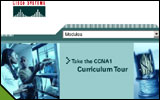
CCNA 1 - DEMO |
|
top
|
CCNA 2 - Routers and Routing Basics v 3.0
Module
1: WANs and Routers
1.1 WANs
1.2 Routers
Module 2: Introduction
to Routers
2.1 Operating Cisco IOS Software
2.2 Starting a Router
Module
3: Router Configuration
3.1 Configuring a Router
3.2 Finishing the Configuration
Module 4: Learning about
Other Devices
4.1 Discovering and Connecting to Neighbors
4.2 Getting Information about Remote Devices
Module 5: Managing Cisco
IOS Software
5.1 Router Boot Sequence and Verification
5.2 Managing the Cisco File System
Module 6: Routing and
Routing Protocols
6.1 Introduction to Static Routing
6.2 Dynamic Routing Overview
6.3 Routing Protocols Overview
Module 7: Distance Vector
Routing Protocols
7.1 Distance Vector Routing
7.2 RIP
7.3 IGRP
Module 8: TCP/IP Suite
Error and Control Messages
8.1 Overview of TCP/IP Error Message
8.2 TCP/IP Suite Control Messages
Module 9: Basic Router
Troubleshooting
9.1 Examining the Routing Table
9.2 Network Testing
9.3 Troubleshooting Router Issues Overview
Module 10: Intermediate
TCP/IP
10.1 TCP Operation
10.2 Overview of Transport Layer Ports
Module 11: Access Control
Lists (ACLs)
11.1 Access Control List Fundamentals
11.2 Access Control Lists (ACLs)
|
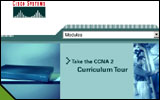
CCNA 2 - DEMO |
|
top
|
CCNA 3 - Switching Basics and Intermediate Routing v 3.0
Module
1: Introduction to Classless Routing
1.1 VLSM
1.2 RIP Version 2
Module 2: Single Area
OSPF
2.1 Link-state Routing Protocol
2.2 Single Area OSPF Concepts
2.3 Single Area OSPF Configuration
Module 3: EIGRP
3.1 EIGRP Concepts
3.2 EIGRP Configuration
3.3 Troubleshooting Routing Protocols
Module 4: Switching Concepts
4.1 Introduction to Ethernet/802.3 LANs
4.2 Introduction to LAN Switching
4.3 Switch Operation
Module 5: Switches
5.1 LAN Design
5.2 LAN Switches
Module 6: Switch Configuration
6.1 Starting the Switch
6.2 Configuring the Switch
Module 7: Spanning-Tree
Protocol
7.1 Redundant Topologies
7.2 Spanning-Tree Protocol
Module 8: Virtual LANs
8.1 VLAN Concepts
8.2 VLAN Configuration
8.3 Troubleshooting VLANs
Module 9: Virtual Trunking
Protocol
9.1 Trunking
9.2 VTP
9.3 Inter-VLAN Routing Overview
|
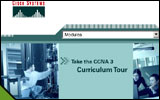
CCNA 3 - DEMO |
|
top
|
CCNA 4 - WAN Technologies v 3.0
Module
1: Scaling IP Addresses
1.1 Scaling Networks with NAT and PAT
1.2 DHCP
Module 2: WAN Technologies
2.1 WAN Technologies Overview
2.2 WAN Technologies
2.3 WAN Design
Module 3: PPP
3.1 Serial Point-to-Point Links
3.2 PPP Authentication
3.3 Configuring PPP
Module 4: ISDN and DDR
4.1 ISDN Concepts
4.2 ISDN Configuration
4.3 DDR Configuration
Module 5: Frame Relay
5.1 Frame Relay Concepts
5.2 Configuring Frame Relay
Module 6: Introduction to
Network Administration
6.1 Workstations and Servers
6.2 Network Management |

CCNA
4 - DEMO |
|
top
|
IT
Essentials I
Whom it concerns:
This course appeals to those adults who are re-qualifying, students.
Description:
During IT Essentials course, students learn how the hardware and software components of a computer work, which are the best ways to maintain the system and using them in a safe manner. With the help of practical activities they will learn how to assemble a computer, how to install operating systems and software, to mend and maintain hardware and software.
Duration:
The course lasts 2 months.
Required knowledge:
English language-medium level. There is no need to have previous knowledge in computer science.
IT Essential I - PC Hardware and Software - v
3.0
Module
1: Information Technology Basics
Module 2: How Computers Work
Module 3: Assembling a Computer
Module 4: Operating System Fundamentals
Module 5: Windows 9x Operating Systems
Module 6: Windows NT/2000 Operating Systems
Module 7: Windows XP Operating System
Module 8: Multimedia Capabilities
Module 9: Advanced Hardware Fundamentals for Servers
Module 10: Networking Fundamentals
Module 11: Printers and Printing
Module 12: Preventive Maintenance and Upgrading
Module 13: Troubleshooting PC Hardware
Module 14: Troubleshooting Software
|
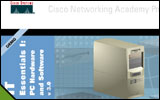
IT 1 - DEMO |
|
top
|
IT
Essentials
II
Description:
This course is an intensive guide in Multiuser Networking
Operating System.
The characteristics of Linux, Windows 2000, NT and XP
operating systems will be debated. Students will explore
a variety of themes including installation procedures,
security elements, back-up procedures and distance access.
Duration:
The course lasts 2 months.
IT
Essential II - Network Operating System- v 2.0
Module
1: Operation System Fundamentals
Module 2: Introducrion to Networking
Module 3: Physical Components of A Network
Module 4: TCP/IP Networking
Module 5: Overview of Network Services
Module 6: Introduction to Network Operating System
Module 7: Overview of the Installation Process
and Boot Process
Module 8: Windows 2000 Professional
Module 9: Linux
Module 10: Advance NOS Administration
Module 11: Network Security
|
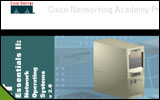
IT 2 - DEMO |
|
top
|
UNIX
(Bazele sistemului de operare UNIX)
Whom it concerns:
This course appeals to those adults who are re-qualifying, students.
Description:
Basic commands of UNIX, file and directory system, rights, shell commands, text editors, and network usage.
Duration:
The course lasts 2 months.
Required knowledge:
English language-medium level. Basic knowledge in computer science.
Fundamentals
of UNIX - v 2.0
Module
1: The UNIX Computing Environment
Module 2: Accessing a System and UNIX Graphical
Interfaces
Module 3: Graphical User Applications
Module 4: Getting Help
Module 5: Accessing Files and Directories
Module 6: Basic Directory and File and Management
Module 7: Advanced Directory and File and Management
Module 8: File Systems and File Utilities
Module 9: Using Text Editors
Module 10: File Security
Module 11: Printing
Module 12: Backing Up and Restoring
Module 13: System Processes
Module 14: Shell Features and Environment Customization
Module 15: Introduction to Shell Scripts
Module 16: Network Concepts
Module 17: Career Guidance
|
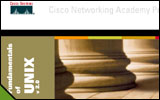
UNIX - DEMO |
|
top
|
Fundamentals of Wireless LANs
Fundamentals of Wireless LANs is an introductory course that will focus on the design, planning, implementation, operation and troubleshooting of wireless networks. It covers a comprehensive overview of technologies, security, and design best practices with particular emphasis on hands-on skills in the following areas:
- Wireless LAN setup & troubleshooting
- 802.11a & 802.11b technologies, products and solutions
- Site Surveys
- Resilient WLAN design, installation and configuration
- WLAN Security - 802.1x, EAP, LEAP, WEP, SSID
- Vendor interoperability strategies
This course will prepare students to achieve the Cisco
Wireless LAN Support Specialist designation.
Course Length: 2 months
Fundamentals
of Wireless LANs - v 1.0
Module 1: Introduction to Wireless LANs
Module 2: 802.11 and Network Interface Cards
Module 3: Wireless Radio Technology
Module 4: Wireless Topologies
Module 5: Router Intrusion Detection, Monitoring
and Management
Module 6: Bridges
Module 7: Antennas
Module 8: Security
Module 9: Security Translations and Connections
Module 10: Security ACLs
Module 11: Troubleshooting Management, Monitoring,
and Diagnostics
Module 12: Emerging Technologies
Appendix A1: The Physical Layer
|

Wireless LANs- DEMO |
|
top
|
Fundamentals of Network Security
Fundamentals of Network Security will teach students to design and implement security solutions that will reduce the risk of revenue loss and vulnerability.As with existing courses offered by the Cisco Networking Academy, the focus of the course will combine hands-on experience, instructor-led and e-learning for students.
The 70-hour course will be an introduction to network security and overall security processes. There will be particular emphasis on:
- Security policy design and management
- Security technologies, products and solutions
- Firewall and secure router design, installation, configuration and maintenance
- AAA implementation using routers and firewalls
- VPN implementation using routers and firewalls
This course will prepare students to take the MCNS (Managing Cisco Network Security) and CSPFA (Cisco Secure PIX Firewall Advanced) exams in preparation for the Cisco Firewall Specialist. These exams will also count towards the CCSP (Cisco Certified Security Professional) certification. Successful completion of the course will also prepare students for the CompTIA Security+ exam and for further network security study.
Course Length: 3 months
Fundamentals
of Network Security - v 1.1
Module 1: Overview of Network Security
Module 2: Basic Router and Switch Security
Module 3: Router ACLs and CBAC
Module 4: Router AAA Security
Module 5: Router Intrusion Detection, Monitoring, and Management
Module 6: Router Site-to-Site VPN
Module 7: Router Remote Access VPN
Module 8: PIX Frewall
Module 9: PIX Security Appliance Translations and Connections
Module 10: PIX Security Appliance ACLs
Module 11: PIX Security Appliance AAA
Module 12: PIX Advanced Protocols and Intrusion Detection
Module 13: PIX Failover and System Maintenance
Module 14: PIX VPN
Module 15: PIX Security Appliance Management
|
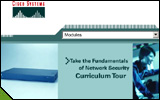
Network Security- DEMO |
|
top
|
CCNA - BRIDGE Course
Whom
it concerns:
This course appeals to those who finished the CCNA course
version 2.1.4 and want to update their knowledge in
this field.
Description:
The course contains the updated information of the latest
technology used in nowadays networks in all over the
world.
Duration:
The whole course (4 modules) - 2 months
Required knowledge:
CCNA course, version 2.1.4
CCNA 1 Bridge Course
Completion to the old modules :
Networking Media
Cable Testing
Ethernet Fundamentals
Ethernet Technologies
|

|
|
top
|
CCNA
2 Bridge Course
Completion to the old modules :
TCP/IP Suite Error and Control Messages
Basic Router Troubleshooting
Access Control Lists (ACLs)
|

|
|
top
|
CCNA
3 Bridge Course
Completion to the old modules :
Introduction to Classless Routing
Single Area OSPF
EIGRP
Switch Configuration
Spanning-Tree Protocol
Virtual LANs
Virtual Trunking Protocol
|

|
|
top
|
CCNA
4 Bridge Course
Completion to the old modules :
Scaling IP Addresses
WAN Technologies
ISDN and DDR
Frame Relay
Introduction to Network Administration
|

|
|
top
|




